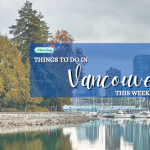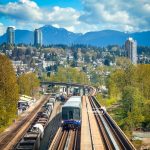Successful First TransitCamp Vancouver
Cool trains, nifty buses running us all over town, happy little sea buses carting us over to the mountainous North Shore, why
This wasn’t a day to rant about Translink (for some people) but it was a day to talk, discuss, brainstorm, address hot-button issues and make some cool art. Some of the session titles were: Ask the Gurus, Best Practices, Car Free Day/Events, Transfers, Building a Community within the Community, Social Media for Transit, Wireless Everywhere Transit… and more.
Roland captured most of it on his UStream, and John was able to make some really great summary posts.
Here’s a short summary from the two sessions I attended:
Evolving from the free day we get on New Years, the topic of encouraging others to take transit instead of their cars generated much discussion.
Should a group of individuals sponsor a pro-active campaign, handing out cards and fliers to riders to promote another “free day” of transit? Something like this would certainly be at a cost to Translink and offering pamphlets to commuters wouldn’t be very effective.
The thought I shared with others in the room was to get Translink to participate in events instead of actually being the initiator ie. there’s a community festival out in Tsawwassen, and all those who attend are encouraged to come by transit. You could even have prizes for those who submit their fare stubs for added incentive. Translink could then be a PARTNER in the event alongside cycling coalitions or other societies and groups.
We also had a brief presentation from Carol Vignale. Along with Ruth who is an Elder with Tsawwassen First Nation, Carol’s group partnered with a member of the CNIB, and the Delta Police/Community Police Station to create “Safe Route Tsawwassen”. The goal here was to reduce numbers of cars coming to schools, provide information about safe routes to schools (new lines, remove shrubs, crosswalks etc.) and to build up the community shuttle program for Tsawwassen.
 Carol, who was also on the GVTA committee and helped with the community shuttle bus initiative, offered up some great information about their group. She was also a part of their local cycling initiative [Canada.com Article]. Carol’s initiative really provides a great module that other communities could put in place and build upon.
Carol, who was also on the GVTA committee and helped with the community shuttle bus initiative, offered up some great information about their group. She was also a part of their local cycling initiative [Canada.com Article]. Carol’s initiative really provides a great module that other communities could put in place and build upon.
A few more topics that came out of this session were: Getting better access to community data, an increase in dialog between riders and Translink, a summarization policies on their website ie. “What is Bill 44?”, and more communication about what resources are available, how they’re available and how Translink actually connects communities.
 Topics for discussion: Why is it so hard to get wifi in public spaces (not just cafes or apartments)? Most are City, Translink owned spaces so herein lies the problem. Are we getting wifi on buses? No, a recent article in a local paper basically made it seem like it but this is actually an internal communication system for operators, which won’t be for the public. However when they implement GPS tracking for the public it will work hand in hand with their new scheduling system, which you can text to get ‘next bus’ information for the stop where you’re waiting.
Topics for discussion: Why is it so hard to get wifi in public spaces (not just cafes or apartments)? Most are City, Translink owned spaces so herein lies the problem. Are we getting wifi on buses? No, a recent article in a local paper basically made it seem like it but this is actually an internal communication system for operators, which won’t be for the public. However when they implement GPS tracking for the public it will work hand in hand with their new scheduling system, which you can text to get ‘next bus’ information for the stop where you’re waiting.
Back to the wifi discussion: Who would provide the blanket bandwidth at transportation hubs/stations? Who would provide the support? Where would it be, places you wait, places where you spend the most time?
What about bandwidth hogs? Where would the hot spot be? Could Translink partner with local shops as access points? Dave points out that in all these scenarios the biggest costs would be tech support and bandwidth.
This particular discussion seemed to really promote FreeTheNet Vancouver, then it turned into something about social networking and media then veered in all other directions before the conch blew announcing time was up.
Things got a little scrambled in a few of the sessions, which mostly consisted of pockets of people in deep discussion, but for the most part things stayed on track. I ducked out before the arts and craft fun times but still got to experience some great conversations. I’m sure more summary posts will pop up, but here are some samples from my photo-documentation this afternoon – the rest are in the Flickr Set.
View more in the Flickr Set.






















16 Comments — Comments Are Closed
just kinda curious – do all you gateway haters also think there should have only been 1 lane each way when they built the massey tunnel? cause it was originally going to be like that.
yes, we need better transit, but we dont have the density to support it. look at paris, ny etc. lots of people in a small space.
it takes courage and foresight to see how things need to be for the future, not just to solve things for right now. *ahem* extra lanes to the north shore anyone?
make the bridges wider. give me more lanes.
[…] it is already being documented with (lots more links) in the blogosphere Tagged with: […]
were there free toques at this one, or did google corner the market on those?
I hit my free toque quota for the week @ Launch Party
Hey BZ
I can’t answer for the Massey Tunnel, but right now with peak oil, human-induced climate change in the making, and a future where local communities will undoubtedly play a bigger part in all aspects of people’s lives because they won’t be able to afford travelling in an SOV to visit friends or attend concerts, we need to think about moving more people more efficiently. There are sound reasons to be opposed to Gateway; willy-nilly allowing for increased SOV travel capacity, encroachment onto valuable natural landscapes and their resident wildlife, facilitating further sprawl, increased greenhouse gas emissions from more cars and more idling, further alienation from our neighbours and local communities which brings up a raft of social problems, and economic idiocy in light of healthcare, educational, social needs that have been sorely neglected by this provincial government.
Maybe we don’t have the density throughout the lower mainland to compare to Paris or New York, but people are looking for well-placed local routes that run on timely and efficient schedules both in the suburbs and in the city. Besides which, transit is a public service and should have priority over individual transportation priviledges – especially in this era of global warming and populations growth.
The company I work for manufacturers WiFi devices as well as Mesh network devices. We also run hotspots up at whistler for the whistler housing etc.
As for transit, you could mesh together the main bus stops/depots for internet relatively easily. You could also charge or not charge people to use it.
There was talk at one point of evening giving wireless onboard the BC Ferries. With the products we manufacture we’ve had people take a wireless link from the top of SFU and shoot it across to the island and maintain like a 20Mbps connection. Just ‘lightup’ the bc ferries route with mesh product or even just have access points on the ferries would work to. As for Transit, I dont see it being impractical… =)
I’d love to take the bus. Truth is, my commute would approach 4hrs total a day on the bus vs the current 50 mins in my car.
Which would you prefer?
bz has posted the same FUD comments on my blog. I suspect he’s actually a developer or some other flacky with a pro-oil, anti-transit conflict of interest trying to shape the discussion online.
The Livable Region Coalition has good information on why the proposed gateway plan is a disaster:
http://www.livableregion.ca/
[…] first transit unconference, as has already been noted by several others in the blogosphere, was a huge success in my opinion. Enormous props go out to […]
– BZ, Metro Vancouver shouldn’t be compared to the much larger cities of New York, London or Paris when considering transit feasibility, but it can be compared to cities such as Vienna and Stockholm in terms of density and population. Stockholm has a metro population of 2 million with a core comparable to Vancouver/Burnaby/New Westminster in area and density. Stockholm also has one of the best air quality records in the world for large urban centres. Both Stockholm and Vienna have not only several metro lines, but also a good number of light rail lines, commuter trains and effective bus routes. Stockholm and Vienna are both consistantly in the top-ranked cities for quality of life.
Metro Vancouver is at the point where we can either continue to sprawl and build roads which will actually increase driving time – ever driven through Seattle at rush hour? – or contain growth and provide reasonable commuting times via improved transit including 2-way commuter trains built on low-use rail lines (much less expensive than the skytrain/canada line or nothing planning of recent), limited-stop bus routes, better local bus routes and cycling programs, such as those being implemented in Geneva – another smaller metropolis. North Americans, in general, need more education in regards to the benefits of transit. We do not NEED cars as much as we have been programmed to believe. As a native Vancouverite who loves Vancouver, but who has also lived in Europe, one of the reasons that European cities rank high in quality of life is their commitment to transit.
I suggest you do some research on transit before you commit yourself to support of the Gateway Program.
[…] from Miss604 […]
[…] Miss604 […]
[…] and a few “un-conferences” (that’s the term used by geeks – see for example Rebecca’s write-up about Vancouver TransitCamp). Many of my geek events are centered around a main […]
[…] all going to be learning how to mix drinks unlike the topics at the more literally named VinoCamp, TransitCamp, or MobileCamp. BarCamp is an ad-hoc un-conference born from the desire for people to share and […]
[…] Karen Quinn Fung – Independent initiative (Karen recently organized the Skytrain Security Unconference as well as TransitCamp) […]
[…] someone I’ve been lucky to hang out with at various social media events around town including Vancouver Transit Camp, which she organized. She’s blogging today for the very cool Vancouver Public Spaces Network, […]